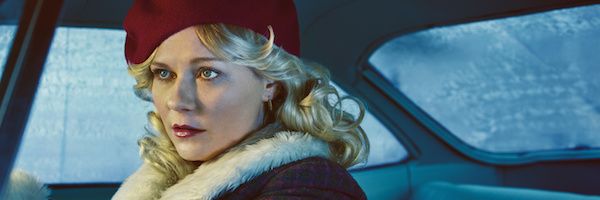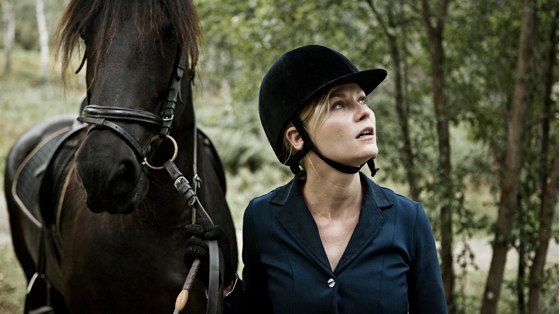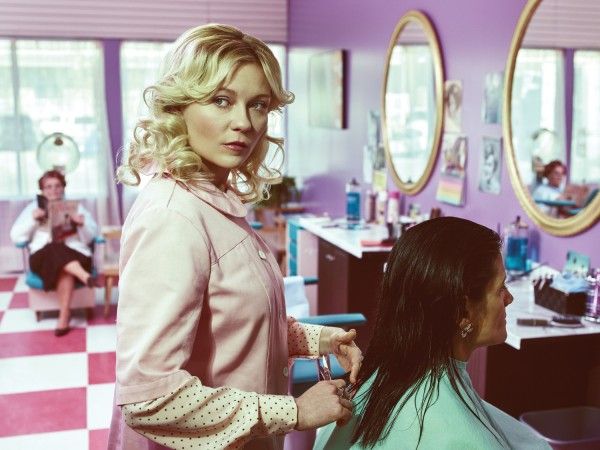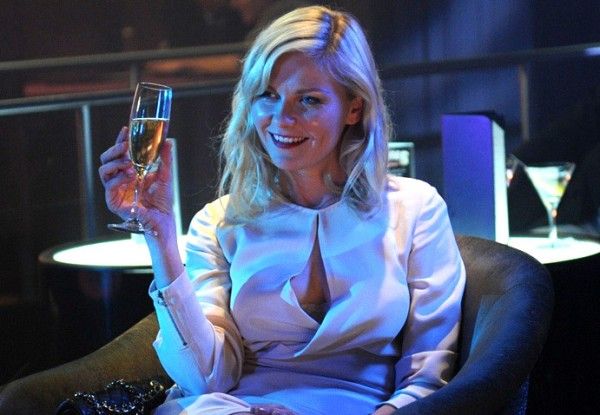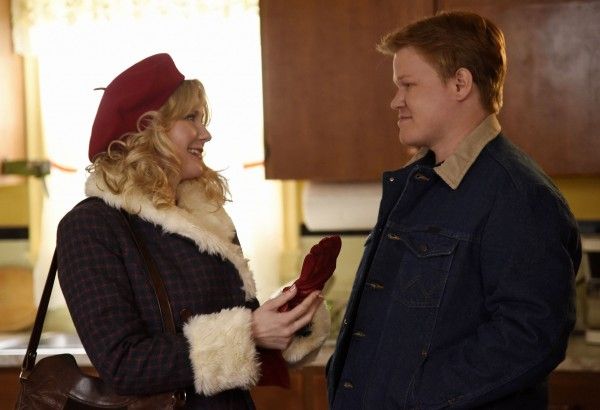[Note: With news that Kirsten Dunst will make her directorial debut with an adaptation of Sylvia Plath's novel The Bell Jar—a work that is one of the frankest depictions of depression—we re-posted this feature about Dunst's time away from the spotlight.]
The opening shot of Lars Von Trier’s Melancholia features a close-up of Kirsten Dunst’s expressionless face. The world is coming to an end, and behind her dead birds fall to the ground. Yet Dunst remains paralyzed. Her eyes are swollen and black around the edges, and her closed lips, turned slightly downward, convey an eerie but deliberate indifference.
It’s a marked turn from Dunst’s role as Fargo’s Peggy Blomquist, a seemingly sweet and innocent hairdresser and wife whose dark side becomes increasingly evident after a pivotal incident in the Season 2 premiere. Taking on a Minnesotan accent to the point of caricature, Dunst is, so far, a comedic gem. She sports a singsong voice and an “I didn’t do it” look that registers the exact opposite, even as she’s eating Hamburger Helper and tater tots. While the premiere only hints at her mischievousness, subsequent episodes build on her character significantly. Even in such a great ensemble piece, there’s no one who’s more fun to watch.
But back in 2011, Melancholia was Dunst’s first major role after Sam Raimi’s Spider-Man trilogy wrapped in 2007, and a notable change of pace in her long career. It began with a brief appearance in Woody Allen’s Oedipus Wrecks, but things truly took off with her fiery Golden Globe-winning performance in 1994’s Interview with a Vampire. She was 11 years old.
Coinciding with the release of Melancholia, which, as is its title suggests, paints a portrait of deep ennui (the film explores the evolving relationship between two sisters as a rogue planet approaches Earth), Dunst opened up about her own struggles with depression, and her need to vacate the world of acting shortly after she finished with Spider-Man.
“I definitely took a little bit of a break. And also, when you’re in your twenties you need figure things out and take a step back. I had been acting so long, all my life. I think I just needed a little bit of some perspective,” the actress told Ellen DeGeneres in an interview in late 2011. “As an actress you’re supposed to be sensitive and vulnerable and have this side to you. But then you’re supposed to be super sociable and ‘on’ and like nice to everybody. That’s a weird dichotomy. It’s a lot to ask of a person. It’s not a normal thing.”
While Dunst is certainly not the first actor to speak openly about mental illness, her candidness has undeniably contributed to the destigmatization of depression, especially in Hollywood. Sarah Silverman, in promoting her new film I Smile Back last week, opened up about her own battle with depression. Angelina Jolie, Halle Berry, and Jon Hamm have also gone on the record to speak about their struggles. What’s difficult to fathom however, and may be difficult for some to consider, is that depression is a creeping force, a darkness that can seep inside you at any moment. It can be dormant one day, and aggressive the next. It’s why self-care is so important, and that seems to be something Dunst has taken to heart.
While Dunst’s return to acting may not have been as explosive as fans may have wished it to be, there’s something admirable about the way she has reentered the scene, in terms of the projects she’s been taking as well as through a more personal consideration. Her moves have been intelligent, calculated, and perhaps most importantly, Dunst appears to be taking on roles that suit her, all on her own terms. There isn’t a large blockbuster in her recent filmography, or anything that would launch her back under the scrutiny of spectators, but she remains steadily at work.
Since Melancholia, Dunst has diversified her resume with a series of roles, all different and varying in scope. She was a highlight in 2012’s Bachelorette, which was a cruder (and better) Bridesmaids that focused on a group of dysfunctional friends who get together for the wedding of a high school pal they never really liked. Dunst plays the maid of honor, Reagan, an acid-tongued workaholic who gives a whole new meaning to type A personalities.
Though some of Dunst’s filmic decisions haven’t been as fruitful, she’s never been anything but a standout, even in the dull thriller Upside Down and an adaptation of Jack Kerouac’s On the Road, both in 2012. She was also powerful in The Two Faces of January, a middling Patricia Highsmith adaptation from 2014 where she starred alongside Viggo Mortensen and Oscar Isaac.
It would be inaccurate to call these latest moves “a comeback,” especially considering that though Dunst took a four-year break, her profile never waned. Instead, this feels more like a restructuring, with other criteria taking precedence in the way she selects her roles. After all, for a while she was considered Sofia Coppola’s muse, appearing as a lead in the director’s Virgin Suicides (1999) and Marie Antoinette (2006), and also worked with the likes of Michel Gondry, Cameron Crowe, and the ever-controversial Von Trier. Recently, Dunst has remained busy with a role in Midnight Special, the latest picture by the supremely talented Jeff Nichols (Mud) and Woodshock, a mysterious film project written and directed by two of her closest friends, Kate and Laura Mulleavy, the sisters behind fashion label Rodarte.
But when it comes to returning to acting, it’s been a gradual climb. Last week Dunst began her run on FX’s acclaimed (though cultishly viewed) Fargo, loosely based -- in tone at least -- on the masterful Coen Brothers film. As the surprisingly nefarious hairdresser Peggy Blomquist, Dunst is one of the leads in the series’ second season, and even just a few episodes in she stands out amongst a wonderful cast, which includes Patrick Wilson, Ted Danson, and Jean Smart. Though on the small screen, Peggy feels like an ideal role for Dunst, particularly in the way it continues to build her reputation as a great actress. But also, it’s ideal in that it allows her to escape the chaos that accompanies leading a franchise.
As Melancholia closes, Dunst’s character transforms into someone new: less complacent, more in control of her environment. It’s an easy metaphor, but in terms of how to maneuver your way through a long career -- one filled with speed bumps -- it may be the best one.

